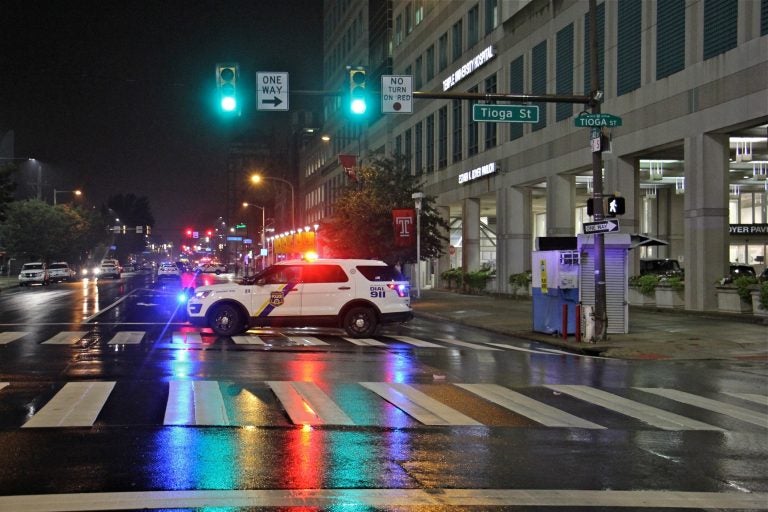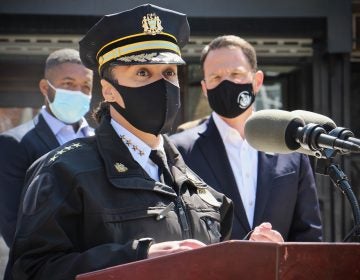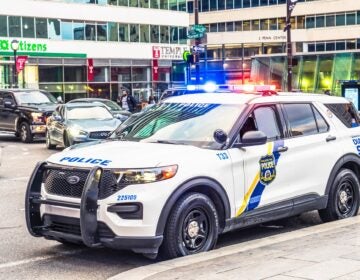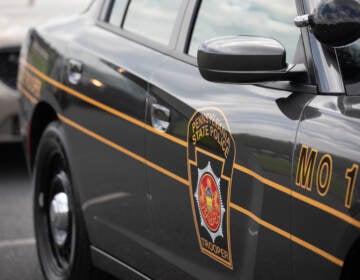Philly bill to ban minor traffic stops will be reintroduced after months of negotiations
The bill is rooted in recent data that show Philadelphia police pull over a disproportionate number of Black drivers for minor traffic violations.

Police stop traffic on Broad Street outside Temple University Hospital. (Emma Lee/WHYY)
After months of negotiations, City Councilmember Isaiah Thomas on Thursday will reintroduce a bill that would bar officers from stopping drivers solely for minor traffic violations like having a broken brake light.
The new version of the measure further specifies which traffic violations could be the subject of a car stop, and which violations would simply result in a warning or citation sent in the mail. The bill also opens up the possibility of Mayor Jim Kenney issuing an executive order that mirrors the bill’s language.
Additionally, Thomas said he will introduce a related bill that would require the Police Department to track information related to car stops within city limits.
“What we hope we have is the solution to what a lot of people, not just in Philadelphia, but across the country, have seen is a crisis that we’re facing,” said Thomas.
Thomas first introduced the bill in October, arguing it would maximize police resources while also reducing racial profiling, something Thomas said he has experienced himself while driving.
He says it could also reduce the chance of a car stop escalating and turning violent the way it did for Philando Castille. Police in Minneapolis-St. Paul pulled over Castille 49 times over 13 years, mostly for minor infractions, according to The New York Times. An officer fatally shot Castille, who was Black, during a traffic stop over a broken taillight in July 2016.
Thomas’ measure, believed to be the first municipal legislation of its kind, is rooted in recent data that show Philadelphia police pull over a disproportionate number of Black drivers for minor traffic violations compared to white and Latino drivers. According to the same data from 2018 and 2019, only a small percentage of these stops result in an officer confiscating any kind of contraband, including illegal guns.
The mayor of Portland, Oregon on Tuesday announced that police should no longer stop drivers for minor infractions, citing the disproportionate impact on Black people. Oakland, California has had a similar policy on the books for several years, according to the Associated Press.
The Philadelphia Police Department and the city’s Law Department initially had concerns about the measure, despite the fact Police Commissioner Danielle Outlaw and City Solicitor Diana Cortes both supported the bill’s intent, said Thomas.
Those departments are now largely on board following a series of collaborative “working group” meetings that also involved the Defender Association of Philadelphia, which helped draft the bill, said Thomas.
“There was acknowledgement of the civil rights violations. There was acknowledgement of these issues and concerns,” he said. “But there was not agreement on the city solicitor’s side whether or not we had legal precedent. And then on the law enforcement side, what we should and should not pull people over for.”
Under the new version of the bill, police would still be able to pull over a driver for so-called primary violations. That category essentially covers traffic offenses that deal with how a driver operates their car — violations that can compromise public safety, such as blowing a stop sign or running a red light.
If passed, police would not be allowed to stop drivers if the only offense was committing so-called secondary violations. The list includes driving with a broken brake or tail light, as well driving without an inspection or emissions sticker.
“This is what I would call not defunding the police: not less policing, but smart policing,” said civil rights attorney David Rudovsky, whose law firm filed a federal lawsuit to reduce racial disparities found with “stop-and-frisk” policing.
Thomas’ bill would not have necessarily prevented the fatal shooting of James Alexander in the Logan section of the city in early April.
Police said they pulled over the Kia sedan the 24-year-old Black man was traveling in because the driver allegedly blew a stop sign, even though the department has admitted there are no stop signs along the stretch of Somerville Avenue where the vehicle was stopped.
Five officers fatally shot Alexander after he allegedly fired at a group of police who were trying to remove him from the vehicle.
A police spokerson did not immediately respond to a request for comment on Thomas’ bill.
It’s unclear if Kenney intends to introduce an executive order or when it might take effect. Mayoral spokeswoman Deana Gamble declined to comment on either question on Wednesday.
City Council’s legislative session on Thursday is its last before the body takes a summer recess and returns in the fall.
Thomas said having an executive order, which doesn’t require anything more than the mayor’s signature, is less about implementing the proposed changes faster, and more about publicly signaling that the Kenney administration supports the measure and the collaborative effort that birthed its latest version.
Thomas said there is no timeline for getting the measure passed in Council, saying he’ll spend the summer raising awareness and getting additional input on the measure, particularly from residents and rank-and-file police officers.
“This is something that we feel like is historic in nature, it’s something that we feel like can address a serious civil rights issue that we have in the City of Philadelphia,” said Thomas. “And the most important thing with something like this is not when it’s done, but how it’s done.”

Get daily updates from WHYY News!
WHYY is your source for fact-based, in-depth journalism and information. As a nonprofit organization, we rely on financial support from readers like you. Please give today.






